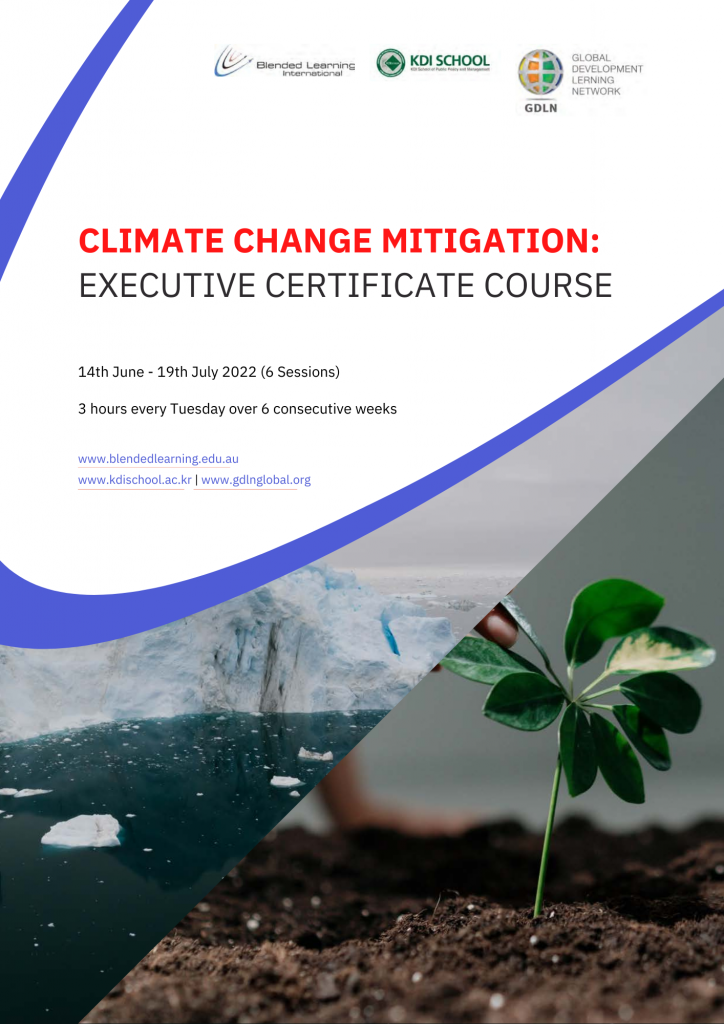CLIMATE CHANGE MITIGATION: EXECUTIVE CERTIFICATE JUNE 2022
CLICK HERE TO VIEW THE FULL BROCHURE FOR THIS COURSE

WHY THIS COURSE?
Blended Learning International (BLI) is pleased to provide this course in conjunction with KDI School. BLI and KDIS are affiliates of the Global Development Learning Network (GDLN). It is a Professional Certificate Course in Climate Change Mitigation. The format for this Professional Certificate Course is similar to the Executive Certificate Courses delivered jointly by BLI and KDIS during 2020 and 2021 on Pandemic and Resilience Policy and on National Cyber Emergencies.
This course will seek to familiarize participants with policy ideas and case studies from around the world in the battle for climate change adaptation. Resilience is a recurring theme for which the course components penetrate more deeply into what that means, using specific cases. For example, less developed countries do share common relative resource limits for climate response. But, there are important variations. Communities whose habitation is at risk of permanent inundation from sea levels may be far worse off than communities that face increased frequency of irregular severe flooding from severe weather events.
Both framework and specificity are proposed as features of the course, as is the drawing on global knowledge. It will also emphasise physical and natural science knowledge and social science knowledge,
to give holistic policy options for nations.
These distinctive approaches are especially useful for those interested from government, business, education and community sectors, and reflect the unique focus and nature of GDLN work, that complements the more specialized conventional education available.
The Executive Certificate course is to be delivered online in weekly sessions over six weeks. Each weekly session is 3 hours including a 10 minute break. The Certificate award is based on course participation, and no further assessment is required at this executive level. The course has been designed to meet standards required for KDIS endorsement and accreditation.
The earlier webinars and executive courses on Pandemic and Resilience Policy were very well-received. Previous course evaluations on the topics of pandemic and resilience policy were consistently excellent. With respect to different time zones, this course will be delivered directly for the Asia-Pacific region, but those in other regions are very much encouraged to participate and supportive out- of-session arrangements can also be made.
COURSE CONTENT AND APPROACH
The course is to be delivered live online. It is being coordinated by ANU Professor Glenn Withers, GDLN
Global Board Chair, advised by Professor Greg Austin, from the International Institute of Strategic
Studies (IISS), Singapore. Additional expert presenters join the course from countries in the Asia-Pacific
region and around the world. The course is delivered in English.
COURSE DATES & TIMES*
Tuesday 14 Jun, 14:00 – 17:00 AEST | Tuesday 21 Jun, 14:00 – 17:00 AEST
Tuesday 28 Jun, 14:00 – 17:00 AEST | Tuesday 5 Jul, 14:00 – 17:00 AEST
Tuesday 12 Jul, 14:00 – 17:00 AEST | Tuesday 19 Jul, 14:00 – 17:00 AEST
*Please check local relevant time zones to match AEST (Australian Eastern Standard Time).
COURSE SCHOLARSHIPS
KDIS Scholarship applications to cover the full fee are available for participants nominated by
GDLN affiliates. Please contact Lisa Materano as indicated below (page 6) for more information.
Applications’ closing date for scholarships is Tuesday 7 June 2022 , but late applications are
welcome and will certainly be considered if positions are still available. Participants who work in
climate change mitigation related employment are especially welcome, but the course is also fully
accessible to participants from all backgrounds.
OTHER COURSE ENTRY
A fee of $655 USD may also be paid to obtain participation for those not supported by KDIS
Scholarships. For group enrolments, fee details will be provided upon request.
PROGRAM
Course Dates, Times and Topics
Tuesday 14 June, 14:00 – 17:00 AEST
1: Challenge and Response
Course Introduction: Ms Lisa Materano, General Manager, Blended Learning International; Professor Glenn Withers, Research School of Economics, The Australian National University; Professor Yun Haiyoung, Korean Development Institute School of Public Policy and Management
1A: The Existential Climate Challenges Identified – Professor Elena Verdolini, University of Brescia and IPCC Lead Author
1B: Frameworks for Response: Markets, Mandarins and Community – Professor Glenn Withers, Research School of Economics, The Australian National University
Tuesday 21 June, 14:00 – 17:00 AEST
2: Policy Frameworks
2A: National Policies for Climate Mitigation – Professor Yeong Jae Kim, Korean Development Institute School of Public Policy and Management
2B: Global Policy Formation for Climate – Professor Frank Jotzo, Crawford School of Government, The Australian National University and IPCC Lead Author
Tuesday 28 June, 14:00 – 17:00 AEST
3: Geographical Differences
3A: The Role of Science, Technology and Innovation – Professor Xiao Hua Wang, UNSW Canberra Engineering
3B: Greening Development: Policies and Instruments – Professor Paul Burke, Head of Development Economics Crawford School of Public Policy, The Australian National University
Tuesday 5 July, 14:00 – 17:00 AEST
4: Community Dimensions
4A: Families, Societies and Climate – Professor Ying Zhang, Faculty of Medicine and Health, University of Sydney and Convenor, Sustainability, Climate and Health Collaboration
4B: Health and Medical Adaptation and Mitigation – Professor Sotiris Vardoulakis, Global Environmental Health, The Australian National University and Director, NHMRC Healthy Environment and Lives Network
Tuesday 12 July, 14:00 – 17:00 AEST
5: Analytic Perspectives
5A: Economic Dimensions of Climate Change – Dr. Federico Macaranas, Asian Institute of Management, Manila and former Vice Minister
5B: Predicting Climate Change Induced Storms – The Eastern Australia Case – Professor Xiao Hua Wang, UNSW Canberra Engineering
Tuesday 19 July, 14:00 – 17:00 AEST
6: The Way Forward
6A: Future Scenarios and Strategies – Dr. Nadeem Samnakay, Fenner School of Environment and Society, The Australian National University and formerly Murray Darling Basin Authority
6B: Leadership and Implementation of Policy for Climate – Dr. Federico Macaranas, Asian Institute of Management, Manila and former Vice Minister
APPLICATIONS AND CONTACT INFORMATION
LISA MATERANO
[email protected]
Mobile & WhatsApp: +61 438 134 558
WeChat: LisaMaterano

